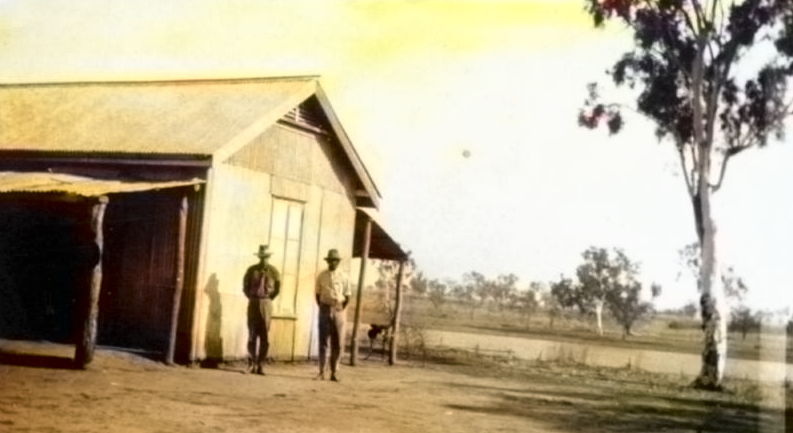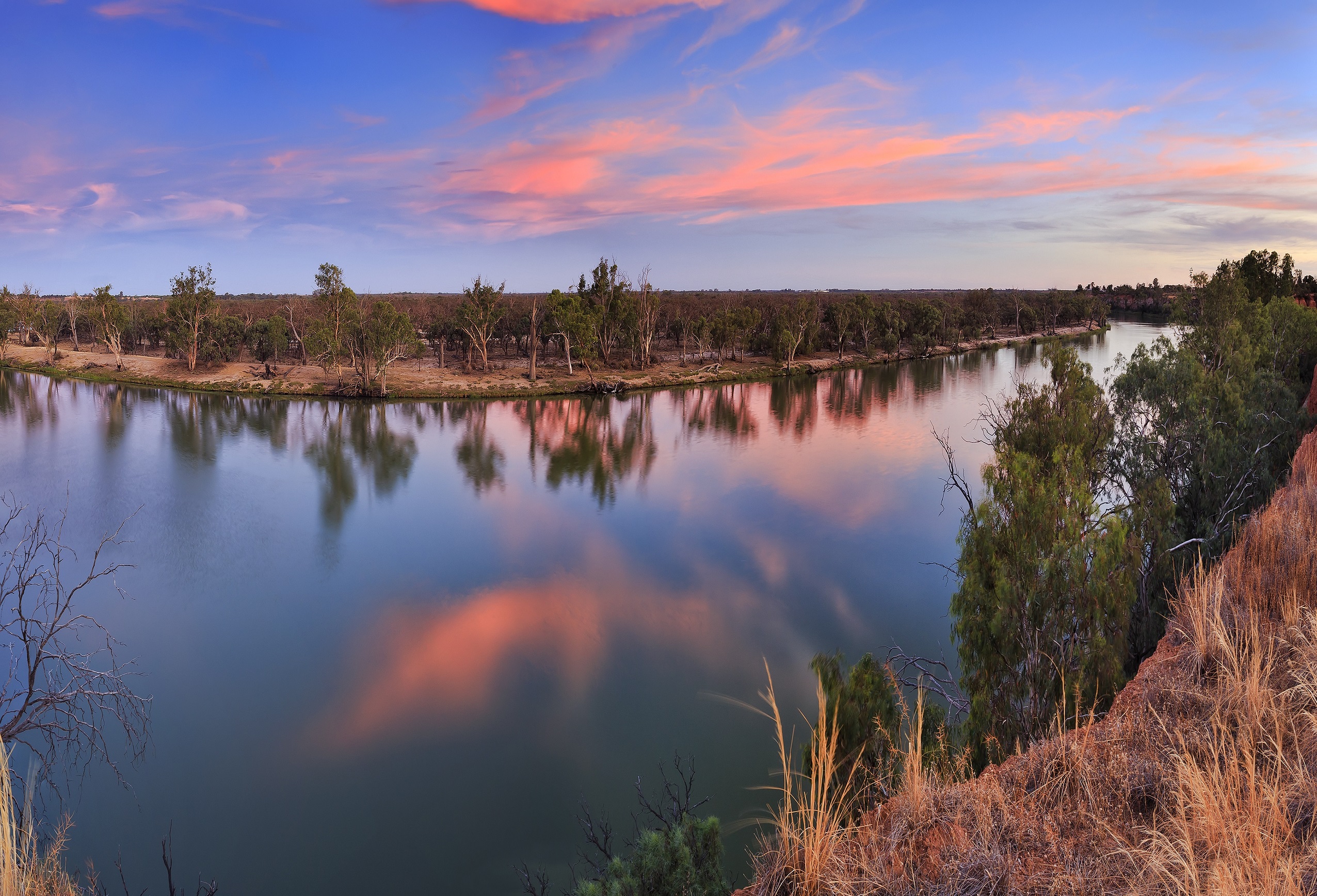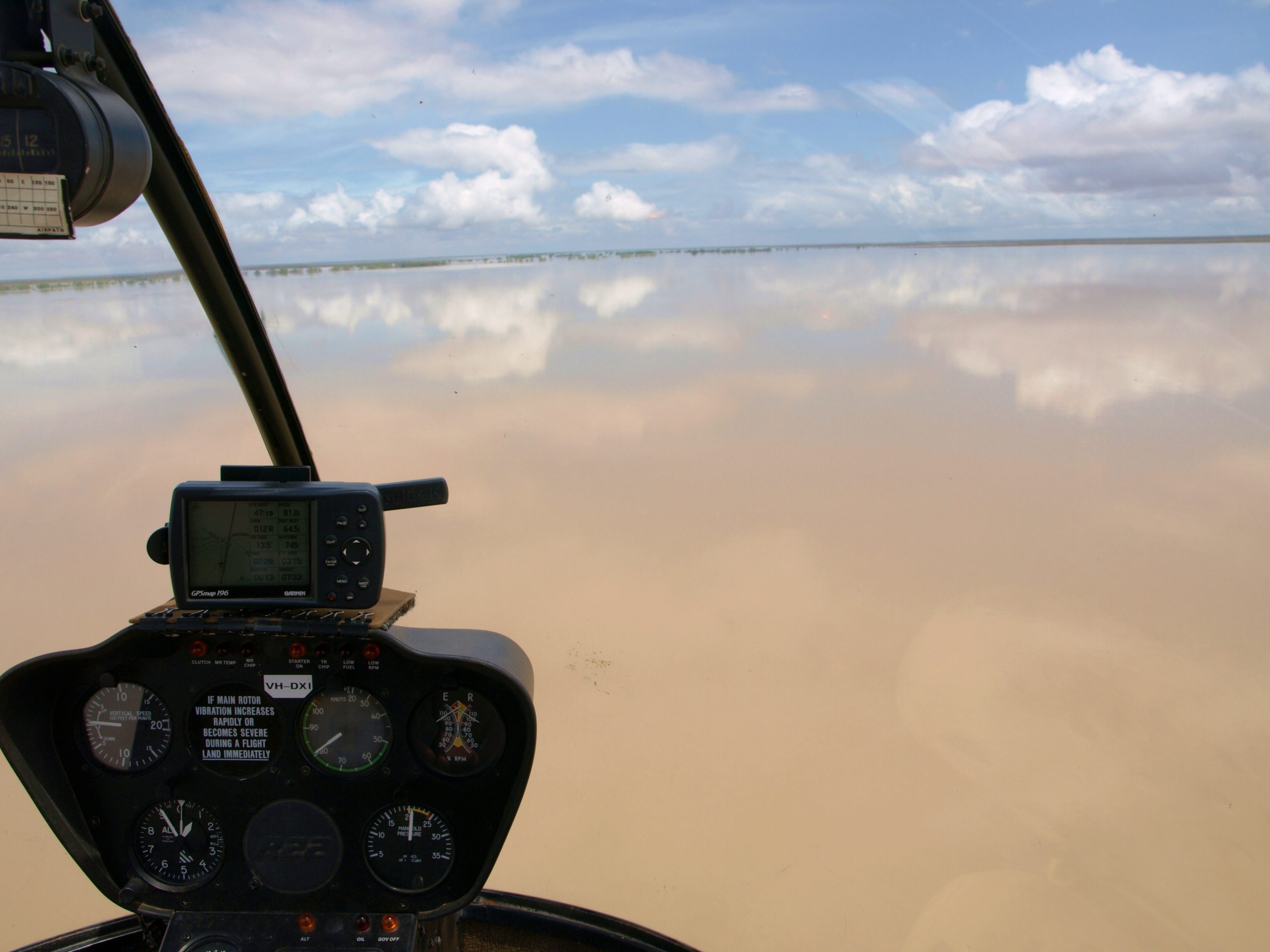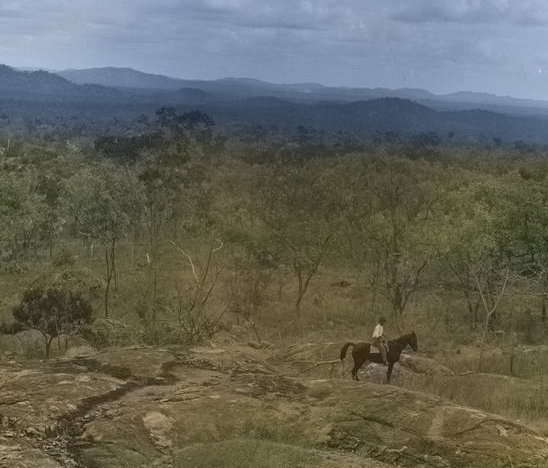
Joe led the police on the merriest dance of their lives. He walked backwards in his prints, swung from tree branches, and waded through every waterhole. He doubled back and stampeded police horses at night, sleeping only in short winks, leaning against a tree, or buried in a hollow under a creek bank.
In this way, while feinting in numerous directions, Joe reached the Nicholson River. There he followed the main channel still sluggish after the long dry season. He passed the pools where, much later, Len Akehurst would baptise souls from the relocated Doomadgee Mission.
At Corinda he allowed himself breathing space. Nearby was the most northerly point of Lawn Hill Station, and home ground for Joe. Around here he knew every knoll and ant-hill studded plain, the swampy ground on the river bends where paperbarks matted the soil with their fibrous surface roots.
Without a weapon he had eaten only bush fruits, one turtle, and some emu eggs along the way, and hunger for meat was enough to send him into the scrub near Turn-off Lagoon, watching Tom Anderson’s grog shanty, sniffing the air at the smell of cooking beef and vegetables, but there were too many people coming and going, loafers outside arguing and drinking. The police camp was also close by, making him wary.
Instead Joe moved on to the homestead owned by the Andersons. He watched from the gardens for a time; a couple of the house girls singing while they hung out washing; another playing with two young children; a boy and a girl, on a patch of green lawn.
When Joe saw Mrs Anderson walk down towards the river he followed her. In a white dress she looked clean and angelic to Joe, and she had always been nice to him.
To Joe’s surprise, on the bank of the river she lifted her dress over her head, then slipped out of her underwear. Mrs Anderson was in her late twenties, and despite the children she had borne, she remained slim and pretty. Joe could not tear his eyes away from her as she climbed into the water, washing and soaking in the effervescent pool.
It was a brave act to swim alone. Joe knew that ‘gators were sometimes seen in the river near here, though a barrage of lead generally accompanied any sighting. Even so, she did not stay in long, and when she had finished, she emerged from the water. Naked and wet she dried off in the morning sun, singing softly to herself. Joe waited until she had dressed, and fixed her hair back in a complicated arrangement that seemed to include multiple pins.
Finally, as she turned to head back up to the house, Joe stepped from the shelter of the trees and stood, watching her, his face imploring her for help.
Mrs Anderson stopped dead still. ‘Joe Flick, is that you?’
‘Yes.’
‘What are you doing here? They’re looking for you everywhere.’
‘I’m hungry for tucker, if you have anything.’
‘Oh God, you poor thing … we can’t tell Tom. Now listen to me, there’s a tool shed just up behind the house, the small one. Go back and hide in there and I’ll bring you some food.’
Later she came to the outhouse where he was hiding. A dog, a brindle-coloured beast of a thing, came with her, uttering a throaty growl when he saw Joe.
‘Pet him a little, and he’ll be friends with you,’ she said.
Joe did as she suggested, nervously stroking the animal’s head between his ears. The growling stopped and the dog moved to a corner where he settled down, laying his head on one paw, yellow eyes flickering open to watch Joe warily.
Mrs Anderson, for her part, hadn’t experienced such excitement in a long time. Mary Theresa by name, she liked men and they liked her. Tom was her second husband, though he had not proved to be much more interesting than the first, though she loved the winding Nicholson and its pandanus-lined banks, the homestead and her bevy of servants – much better than her home town of Forbes, in New South Wales, and her years with William Green in Eulo.
Mary Theresa passed Joe a plate heaped with beef, potatoes and gravy, then watched him eat ravenously.
‘Did you like looking at me, when I was in the water, Joe?’
Joe shook his head. ‘No Missus Anderson. I just wanted to talk to you. Because you’ve always been good to me.’
‘Call me Mary, won’t you please?’
‘Yes, Mary,’ Joe grinned, feeling content with the best meal he had eaten in months.
‘Is there anything else you want?’
Joe decided to push his luck, she reminded him of a cat rubbing itself against the legs of its owner, purring and anxious to please. ‘I need a gun. Can you get me one?’
The young woman felt a shock. This man was an outlaw, and she imagined what might happen down the track if she put a firearm in his hand.
Still, the next day she came back with a bundle wrapped in cloth. Inside, Joe found, was a revolver, along with a supply of caps, powder, and bullets.
‘It’s one of Tom’s old ones,’ Maria said, ‘but I know it works.’
Joe hefted it, examined the bore and spun the cylinder. ‘Thank you.’
The food came three times a day, and the activity was noticeable. The house girls, Joe noticed, started looking in his direction, and the gardener finally came close to the shed and looked inside.
Joe raised the revolver. ‘Tell anyone I’m here and I’ll kill you.’
The gardener ran away across the lawn. Joe knew he should leave that night, but he wanted to say goodbye to Mary, so he stayed.
The food came three times a day, and the activity was noticeable. The house girls, Joe noticed, started looking in his direction, and the gardener finally came close to the shed and looked inside.
Joe raised the revolver. ‘Tell anyone I’m here and I’ll kill you.’
The gardener ran away across the lawn. Joe knew he should leave that night, but he wanted to say goodbye to Mary, so he stayed.
It was a mistake. At dawn the next day one of the girls hurried to the outhouse, where Joe was enjoying an oatmeal porridge Mary had brought out for him.
‘Missus say the p’lice are riding up. You’d better go.’
The warning gave Joe just enough time to take his revolver and head into the scrub, finding a good vantage point of the homestead drive as Troopers Wavell and Noble, along with four black police rode up. On foot beside them, lathered in sweat, was the gardener.
Mary came out to meet them, for Tom had already gone out to work cattle for the day.
‘We’ve heard from your gardener here that Joe Flick was seen near the house,’ said Wavell.
Mary was unflustered. ‘Well he’s mistaken then.’ She looked at the gardener. ‘There was one light-skinned boy who came and asked for work a day or two back and I gave him a feed, but it wasn’t Yella Joe. I’d know him a mile off, seen him lots of times before.’
‘Can we have a look around?’ asked Wavell.
‘Of course you can. Go wherever you like.’
Joe turned, and careful not to leave any sign, headed down to the river.
That night, troopers Wavell and Noble ate dinner at the grog shanty, in a private dining room to one side. Seeing his opportunity, Joe came out of the scrub, and crawled under the building. From underneath the boards he listened to the policemen talk.
Joe picked out Wavell’s voice, and that of the other trooper. He thought of firing up at them between the cracks in the boards, but it seemed too easy, too cruel.
‘Do you think it was wise to leave only one man with the horses?’ said Wavell.
‘Flick’s not here,’ said Noble. ‘That gardener was lying through his teeth.’
‘Still, they’re just there in the river paddock getting good feed. If he really is around, then …’
Horses! Joe’s heart gave a jolt. He knew well that the police always kept plenty of good mounts, and only one man was watching them. Joe slithered out from under the building, and hurried past the police hut to a roughly fenced paddock along the river.
Creeping close in the evening he could see the horses there, grazing on the green pick near the banks. He waited for full darkness before he made his move.
The ‘guard’ by then was fast asleep. Joe wasted no time. He mustered all the horses, including one that he knew was called Collector, and another handy looking bay. The latter he tacked up with the saddle he found on a rail. Mounted at last, and with the pistol in his belt, he drove the small mob out towards the track, finally waking the sleeping man who shouted after him and ran for his rifle.
It would have been easy enough to ride away from there, perhaps head for the Territory border again, but that plan did not appeal to Joe, not this time. He drove the mob of police horses at a canter back to the Turn-off Lagoon shanty, rousing all and sundry as he passed along the route. They came from wurlies, humpies and tents, or stood from camp fires to see the commotion passing by.
Joe let the mob mill in confusion outside the grog shanty, shielding him in a cloud of dust, as he paused to untie and lead away the policemen’s mounts while they were still drinking and eating inside. One was a well-known and indefatigable police mount with the unlikely name of Railway.
‘Yah,’ shouted Joe, whirling in that maelstrom, waving the revolver in his right hand while the raucous drinkers on the verandah shouted and even the policemen ran to see, drawing their revolvers as they came. But the front of a pub was confused with running horses and a lone rider who moved so fast that no one could hope to take a shot at him.
Taking control of the horses again, Joe drove them from town, safe in the knowledge that the police would need to procure new mounts before they could follow, and that they were unlikely to go after an armed man in the night.
Two miles out from town, Joe rounded the police horses into a set of disused yards. He dismounted, and methodically shot all but two in the head with his revolver, feeling no remorse, just a deadly determination. They fell like bags of sand to the dirt, kicked a few times while the others shied and whinnied at the sound and smells of death.
Then, mounted on the bay, and with another as a spare, Joe set off for his home country. The Lawn Hill country that made his heart beat with longing.
Continues next week
©2019 Greg Barron


